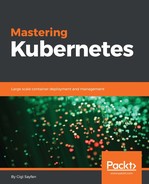Kubernetes has tremendous momentum behind it. The community is super strong. Users flock to Kubernetes as its mindshare increases, the technical press acknowledges its number one leadership position, the eco-system is sizzling, and a lot of big corporations and companies (in addition to Google) support it.
Kubernetes is developed on GitHub and is one of the top projects on GitHub. It is in the top 0.01 percent in stars and number one in terms of activity.
More professionals list Kubernetes in their LinkedIn profile than any other comparable offering by a wide margin.
More than 1,000 contributors and 34,000 commits:

Another indication of Kubernetes momentum is the number of conferences, meetups, and attendees. KubeCon is growing quickly and new Kubernetes meetups open up every day.
Kubernetes is getting a lot of attention and deployments. Large and small companies that get into the containers/DevOps/microservices arena adopt Kubernetes and the trend is clear. One interesting metric is the number of StackOverflow questions over time. The community steps in to answer questions and foster collaboration. The growth dwarfs its rivals and the trend is very clear:

The Kubernetes ecosystem is very impressive, from Cloud providers to PaaS platforms and startups that offer a streamlined environment.
All the major Cloud providers support Kubernetes directly. Obviously, Google is leading the pack with GKE, which is the native container engine on the Google Cloud Platform. The Kops project, mentioned earlier, is a well supported, maintained, and documented solution on AWS. Azure offers Kubernetes as one of its backends to the Azure Container service.
OpenShift is RedHat's container application product that's built on top of the open source OpenShift origin, which is based on Kubernetes. OpenShift adds application lifecycle management and DevOps tooling on top of Kubernetes and contributes a lot to Kubernetes (such as autoscaling). This type of interaction is very healthy and encouraging.
OpenStack is the open source private Cloud platform and it is recently decided to standardize on Kubernetes as the underlying orchestration platform. This is a big deal because large enterprises that want to deploy across a mix of public and private Clouds will have a much better integration with Kubernetes Cloudfederation on one end and OpenStack as a private Cloud platform utilizing Kubernetes under the hood.
The latest OpenStack survey 2017 shows that Kubernetes is the most popular solution for container orchestration:

